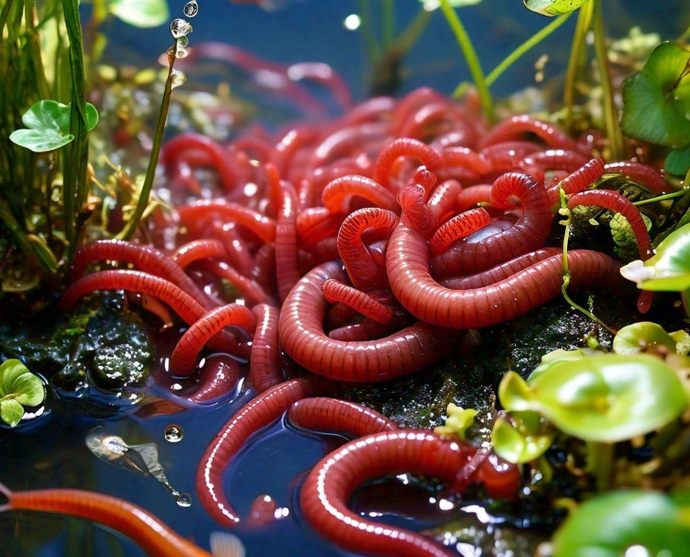Eco-friendly red wigglers: Improve composting
Eco-friendly red wigglers: Improve composting
Blog Article
Why Red Wigglers Are Essential for Organic Farming
Red wigglers play a pivotal role in chemical-free farming, largely via their one-of-a-kind ability to disintegrate organic materials and enhance dirt wellness. Their task not only enriches the dirt with crucial nutrients yet likewise fosters a thriving ecosystem essential for lasting agriculture. Furthermore, the physical procedures they take part in, such as aeration and moisture retention, add considerably to improved plant returns. Nevertheless, the extent of their influence on agricultural methods and soil biology increases intriguing concerns regarding the future of chemical-free farming. What implications might this have for farming techniques?
Duty of Red Wigglers in Soil Health And Wellness

In addition, red wigglers boost dirt framework by developing networks as they delve. These networks boost oygenation and water seepage, advertising a much healthier origin setting. Their task additionally assists in keeping optimum dampness degrees, which is important for healthy and balanced plant development.

Advantages of Worm Castings
Worm spreadings, the nutrient-rich excrement generated by red wigglers, serve as a powerful modification for organic farming. These castings are teeming with necessary nutrients such as nitrogen, phosphorus, and potassium, which are vital for plant development. Unlike artificial fertilizers, worm spreadings launch nutrients slowly, supplying a steady supply gradually and lowering the risk of nutrient leaching and drainage.
Furthermore, worm castings boost dirt structure and aeration, advertising much healthier root systems. Their high organic issue content improves wetness retention, making it possible for plants to better endure dry spell problems. In addition, worm spreadings include helpful microbes that support plant health and wellness by reducing virus and boosting nutrient uptake.
The application of worm castings can cause boosted plant returns and improved quality of produce, making them a vital source for natural farmers. Their usage also aligns with sustainable farming methods, adding to soil fertility without the unfavorable More hints ecological effects related to chemical plant foods. Overall, the consolidation of worm castings into agricultural methods promotes a much more durable and efficient environment, highlighting the value of red wigglers in chemical-free farming systems.

Enhancing Nutrient Cycling
(eisenia fetida for sale)Nutrition biking is a crucial procedure in natural farming, and the assimilation of red wigglers plays a critical role in boosting this cycle. As red wigglers consume decomposing organic issue, they eliminate nutrient-rich castings, which are brimming with valuable microbes.
Additionally, red wigglers help to speed up the mineralization of nutrients, transforming them from inert forms into bioavailable kinds that plants can take in. This process is vital for keeping dirt fertility and promoting healthy crop development. The visibility of red wigglers likewise motivates a varied soil environment, cultivating a balance of nutrients that supports various plant types.
Improving Soil Framework
The improvement of dirt structure is important for promoting a healthy and balanced agricultural environment, and the task of red wigglers significantly adds to this enhancement. These earthworms play a necessary duty in aerating the soil and creating a network of channels that facilitate water infiltration and origin infiltration. As they delve through the soil, red wigglers separate compacted layers, permitting much better oxygen exchange and promoting microbial activity.
Moreover, the natural issue created from their waste, referred to as vermicast, boosts dirt gathering. This procedure develops secure globs of dirt bits, enhancing dirt porosity and minimizing disintegration (red wigglers). The existence of red wigglers likewise motivates the advancement of useful fungal networks, which are vital for nutrient uptake by plants
Supporting Lasting Practices
Integrating red wigglers into chemical-free farming practices not only boosts dirt wellness however likewise promotes sustainable farming approaches. These earthworms play an essential function in nutrition cycling, transforming natural waste right into useful compost that enriches the dirt. By making use of red wigglers, farmers can successfully decrease reliance on artificial plant foods, consequently reducing chemical runoff and its destructive results on environments.
Additionally, the consolidation of red wigglers motivates the method of recycling natural materials, such as cooking area scraps and farm waste. This waste decrease method not only lowers disposal prices but additionally fosters a closed-loop system where nutrients are continually gone back to the soil (red wigglers). Such techniques are necessary in reducing climate adjustment, as they boost carbon sequestration and reduce greenhouse gas exhausts
Additionally, red wigglers boost water retention in the soil, which is crucial in times of drought. Their burrowing tasks produce networks that enable water to pass through deeper into the ground, thus promoting effective water usage. Ultimately, integrating red wigglers into chemical-free farming not just supports biodiversity yet also lines up with the principles of sustainable farming, using an all natural method to food manufacturing.
Conclusion
In final thought, red wigglers play a vital duty in organic farming by dramatically enhancing dirt health and wellness and fertility. Hence, the combination of red wigglers into agricultural practices is essential for advertising sustainability and boosting overall dirt high quality.
Report this page